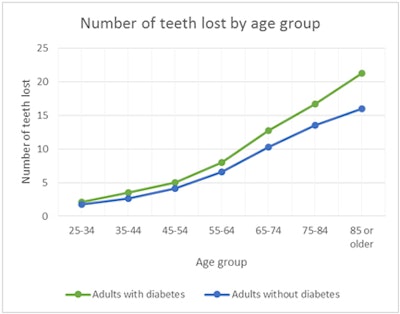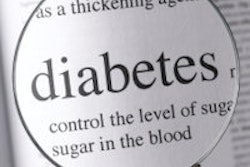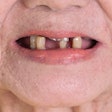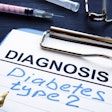
Americans with diabetes lose significantly more teeth than those without diabetes, according to a new study by the U.S. Centers for Disease Control (CDC). The researchers also found tooth loss is especially prominent for non-Hispanic black people with diabetes.
The CDC study used data from thousands of people from various demographics to analyze tooth loss between 1971 and 2012. The finding that those with diabetes lose more teeth is not surprising, however, since diabetes is often related to periodontal disease.
"Research shows a bidirectional relationship between diabetes and periodontal disease," wrote lead author Huabin Luo, PhD, and colleagues (Preventing Chronic Disease, December 3, 2015, Vol. 12:150309). "About half of U.S. adults have periodontal disease, and the prevalence of periodontal disease is even higher for adults with diabetes. Further, periodontal disease is a major risk factor for tooth loss." Luo is an assistant professor in the department of public health at the East Carolina University Brody School of Medicine in Greenville, NC.
Measuring tooth loss
In 2012, almost 30 million Americans age 20 and older had diabetes, yet population-based tooth loss studies for these patients have been rare, according to the authors. Since there is a relationship between diabetes and periodontal disease, they decided to compare tooth loss rates for adults with diabetes and adults without diabetes over time.
"There have been significant improvements in awareness of chronic disease and technological and pharmacological treatment options for diabetes and oral health," they wrote. "These developments may affect the relationship with oral health. Thus, an evaluation of trends in tooth loss, a surrogate marker of oral health, in adults with diabetes is warranted."
The CDC used data from nine different National Health and Nutrition Examination Surveys (NHANES) between 1971 and 2012. The researchers included 37,607 people age 25 and older in their analysis, and the population was broken up by diabetes status, age, and race/ethnicity. Non-Hispanic whites, non-Hispanic blacks, and Mexican Americans were the only races/ethnicities included in the study, because the others lacked sufficient data.
The authors found patients with diabetes lost about four more teeth than adults without diabetes. Adults with diabetes also lost more teeth as they aged.
 All data for charts courtesy of CDC study "Forty-year trends in tooth loss among American adults with and without diabetes mellitus: An age-period-cohort analysis" (Prev Chron Dis, December 3, 2015, Vol. 12:150309).
All data for charts courtesy of CDC study "Forty-year trends in tooth loss among American adults with and without diabetes mellitus: An age-period-cohort analysis" (Prev Chron Dis, December 3, 2015, Vol. 12:150309).However, while patients with diabetes still lose significantly more teeth than those without diabetes, overall rates of tooth loss for all adults declined.
 *For years 1971 and 1988, data were not available for Mexican Americans.
*For years 1971 and 1988, data were not available for Mexican Americans.Out of the studied race/ethnic groups, non-Hispanic black Americans had the fastest increase of rate for tooth loss and lost the most teeth overall, while Mexican Americans lost the fewest number of teeth. Furthermore, non-Hispanic black Americans without diabetes still lost more teeth than adults from other race/ethnicities with diabetes.
 *For years 1971 and 1988, data were not available for Mexican Americans.
*For years 1971 and 1988, data were not available for Mexican Americans.Improving the odds
This study had the advantage of including a large number and variety of U.S. citizens, and the threshold for statistical significance was set at 0.01. Nevertheless, it did have some shortcomings, such as not factoring in whether diabetes onset preceded tooth loss.
The study findings also highlight the need for future oral health research and initiatives to target patients with diabetes, especially those in at-risk demographics, to help prevent tooth loss.
"Targeted initiatives are needed to improve health literacy in people with diabetes, particularly racial/ethnic minority populations," the authors wrote. "Improved access to dental care is essential for the care of adults with diabetes."
The authors also stressed the importance of interprofessional collaboration when caring for adults with diabetes.
"The importance of necessary dental care and tooth retention needs to be further promoted among patients and clinical providers," the authors concluded. "To control diabetes complications, an interprofessional and team-based approach is needed to ensure better care coordination and disease management."


















